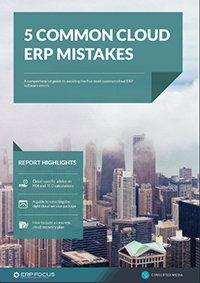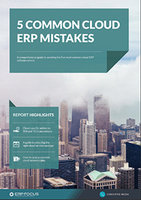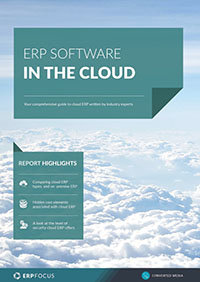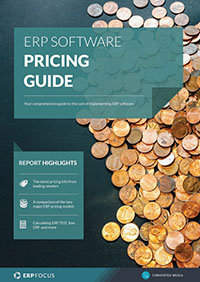ERP Cloud Computing: A Strategy for Success
There seems to be a piece of the puzzle missing from the conventional wisdom amassing about the relative states of ERP, cloud computing, and the future of technology. One camp gleefully trumpets the opinion that ERP is no longer relevant to anything, and we should all be heading off into different cloud applications. Another contingent says ERP cloud computing is on the rise and will soon dominate that space. Still another group contends that purchasing software is so 20th century; we are now a subscription culture, signing up for products and services tailored to suit us individually. We lease our cars, we stream our media, we use phone apps to build our own radio stations.
These trends are being announced by technologists, whose relative prosperity rises and falls with their ability to convince organizations to buy their products. But at the end of all of the posturing and enthusiasm for the latest and greatest, where is the voice of the transaction-based businesses who paid for ERP originally?
Strengths and Weaknesses
ERP cloud computing has a list of oft-repeated strengths and weaknesses. It is not coincidental that most of the strengths align with small and mid-size companies; these are companies that can’t easily afford to own and maintain their own ERP systems. ERP cloud computing also favors technology and service companies over heavy and process manufacturing. However, there is a question that receives too-little press in the ERP cloud discussion: What ERP technology infrastructure results in the best business practices?
This is not a question that can be tossed off with a marketing sound bite. Anyone who unilaterally contends that ERP cloud computing is always cheaper does not understand the concept of amortization; anyone who argues mechanically that an on-site hosted ERP system is ultimately more economical does not understand cash flow. Every aspect of cloud computing has upsides and downsides that need weighed and evaluated.
No one really has the experience or track record to understand how software as a service will impact software development. Without the clear scorecard of system sales, will it not become easy to let development slide a little? Where does the direction, resource allocation, and payback for development come from when an ERP system is just a rented commodity?
What about the contention that the age of ERP is over? Well, that’s a dramatic statement, but it’s incomplete without the other half. If ERP does go away, something still has to keep track of orders, production, inventory, financial transactions – the things that a business has to do. Where is that functionality, and what is its advantage over ERP?
ERP cloud computing should be an option for a business, but it should be chosen because it offers clear strategic business advantage. Technologists need to spend less time talking to each other about the future of technology, and more to the CEOs and CFOs of manufacturing and distribution companies about the future of business.
Free white paper

Five common cloud ERP mistakes
Get your comprehensive guide to avoiding the five most common cloud ERP errors

Featured white papers
Related articles
-
![Three direct links between ERP and manufacturing revenue [image by Snowing on Freepik] Three direct links between ERP and manufacturing revenue [image by Snowing on Freepik]](jpg/three%2bdirect%2blinks%2bbetween%2berp%2band%2bmanufacturing%2brevenue%2b%255bimage%2bby%2bsnowing%2bon%2bfreepik%255d2b6a.jpg)
Three direct links between ERP and manufacturing revenue
What you need to know to help you achieve a return on your manufacturing ERP investment
-

CMMC Compliance: What Aerospace and Defense Manufacturers Need to Know
Key insights on CMMC compliance, deadlines, and securing DoD contracts with CMMC 2.0 certificatio...
-

5 Ways ERP Forecasting Can Improve Business Efficiency
Read about 5 areas of your business which can be dramatically improved through ERP forecasting.



